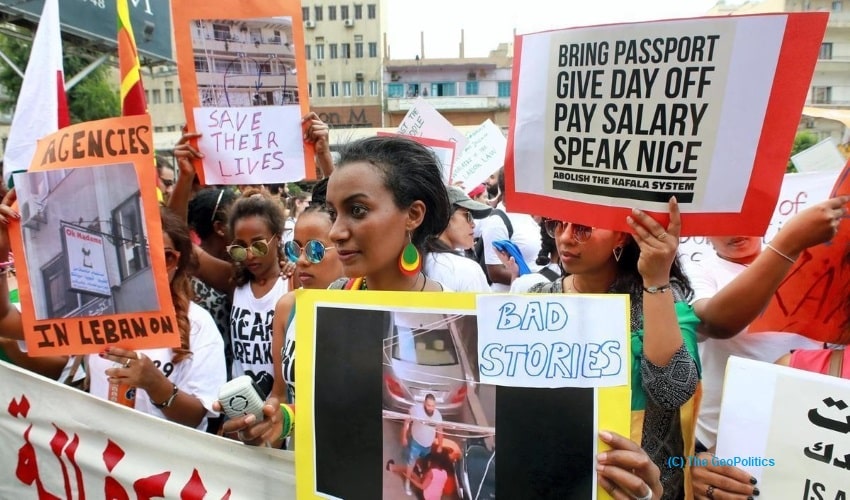

Lebanon takes first step in the same direction. Kafala System, common in Middle East, is an abusive system which binds migrant workers to their employers, reduces them to slaves.
Almost a week after Qatar introduced labor reforms, abolishing the Kafala (Sponsorship) System, Lebanon takes first step in the same direction. Kafala System, common in Middle East, is an abusive system which binds migrant workers to their employers, reduces them to slaves. On Friday the country’s Caretaker Labour Minister Lamia Yammine announced that she issued a new contract for migrant workers, a standard unified contract which “enshrines the rights” of the foreign workers. Of late the country gained quite limelight for the abuse of its foreign workers, whose plight worsened with the country’s collapsing economy and Covid-19 pandemic outbreak.
Migrant worker, even in the most liberal and democratic economies, had been at the receiving end of the coronavirus catastrophe. Their existence was invalided further in Middle East nations with Kafala System, where they had been treated miserably even before the pandemic. Lebanon, which tops the list, has finally resorted to the international pressure of introducing labor reforms.
As per the estimated figures, Lebanon has about 250,000 migrant domestic workers, mostly from Africa and Asia, who are not entitled to the country’s labor law protections including requirement for a minimum wage, overtime pay and freedom of association, according to Human Rights Watch.
Rights groups welcomed the country’s first step in the right direction but highlighted that a lot needed to be done in order to make Lebanon a safe place for migrant workers, especially domestic workers. The activists warned that without strict enforcement of the contract, including labour inspections and complaints procedures, the new contract would hold no significance. The country needs to take firmer actions in order to dismantle the kafala system.
Having a brilliant contract according to international standards without a proper enforcement mechanism is only ink on paper
Diala Haidar, Amnesty International’s Lebanon campaigner.
“As we’re seeing today a number of workers were abandoned by their employers on the street without wages, without luggage, without passports, and no employer was held to account,” she told the Thomson Reuters Foundation.
Zeina Ammar, advocacy manager at Lebanese migrant rights group Anti-Racism Movement, said verifying implementation with the new contract would be the biggest challenge.
“One of the main problems that still exists because of kafala is that the worker is living most of the time with her employer behind closed doors,” she said. “Effectively this means as soon as I close the door nobody knows if I am enforcing the contract or not.”
At least six employees of the U.S. Agency for International Development (USAID) have been put under formal investigation for speaking…
Prince Harry's links to African charitable groups have come under considerable scrutiny after revelations of human rights abuses and internal…
April's unemployment rate in Canada reached 6.9%, the highest in the subsequent period since November 2024. Statistics Canada's data demonstrates…
In a major development, India and the United Kingdom have signed a new agreement providing solutions for Indian workers temporarily…
Former President Donald Trump is taking legal action to strike down one of the topics on the forgotten list of…
As U.S. retailers like Walmart and Costco pursue alternatives to Chinese and Bangladeshi suppliers due to rising tariffs, India's garment…
This website uses cookies.
Read More